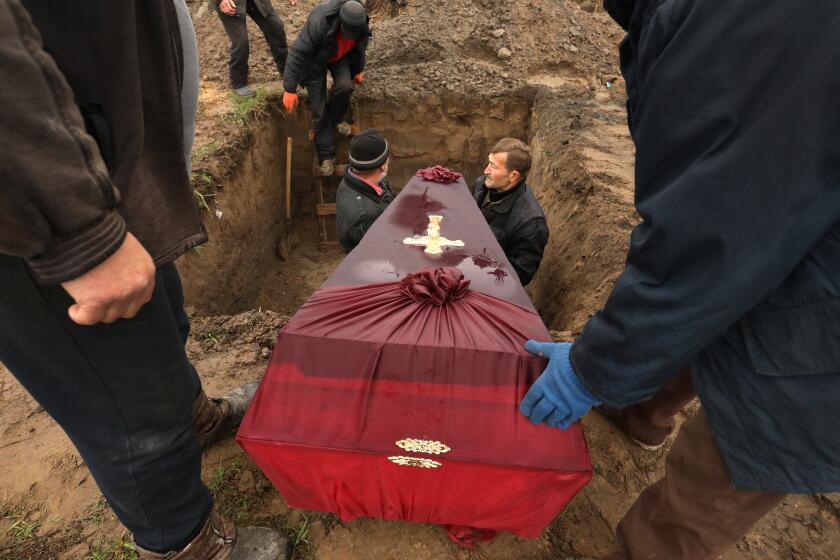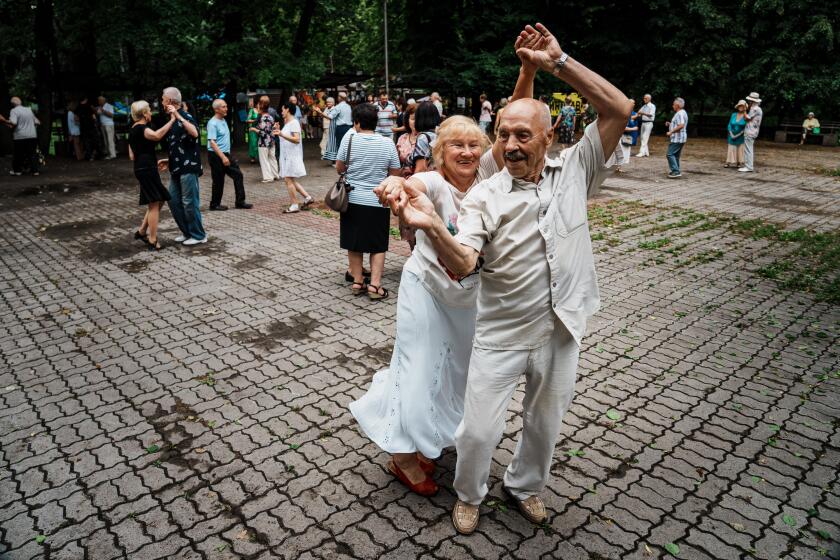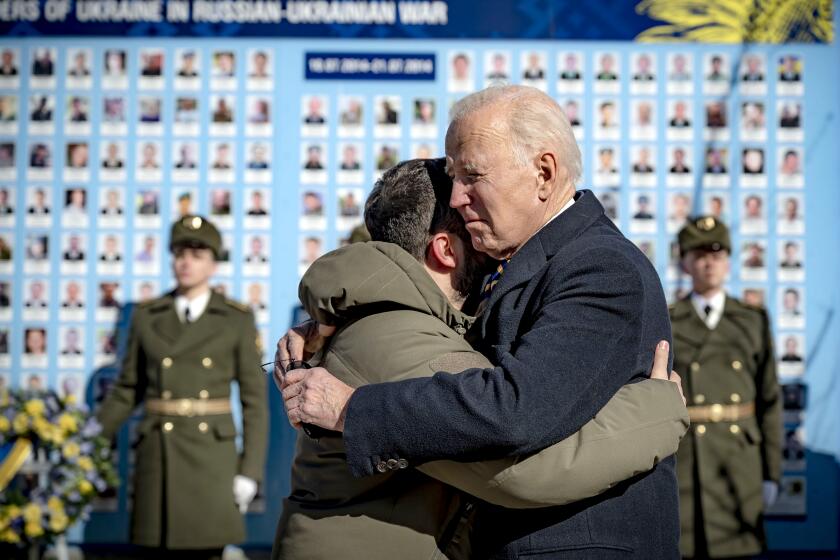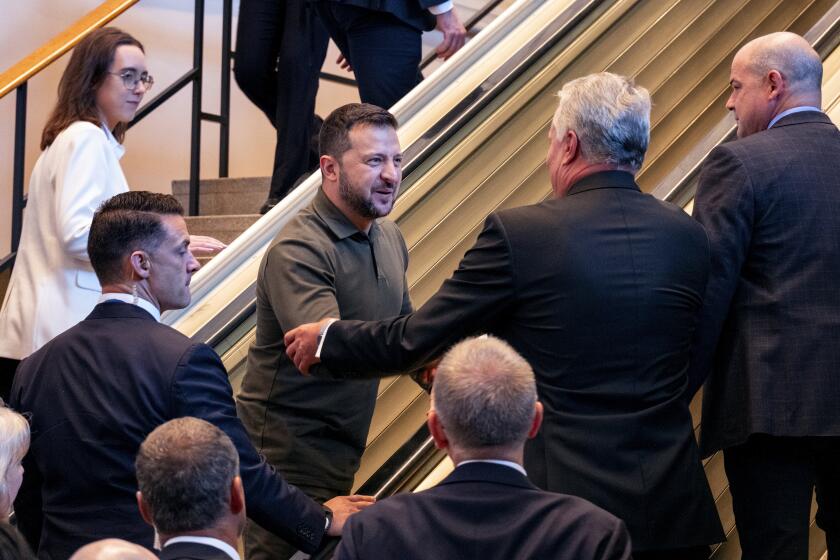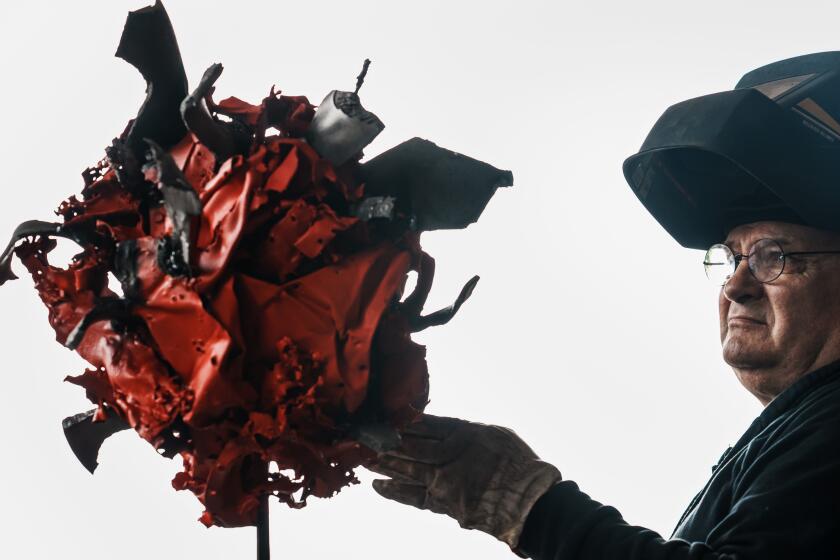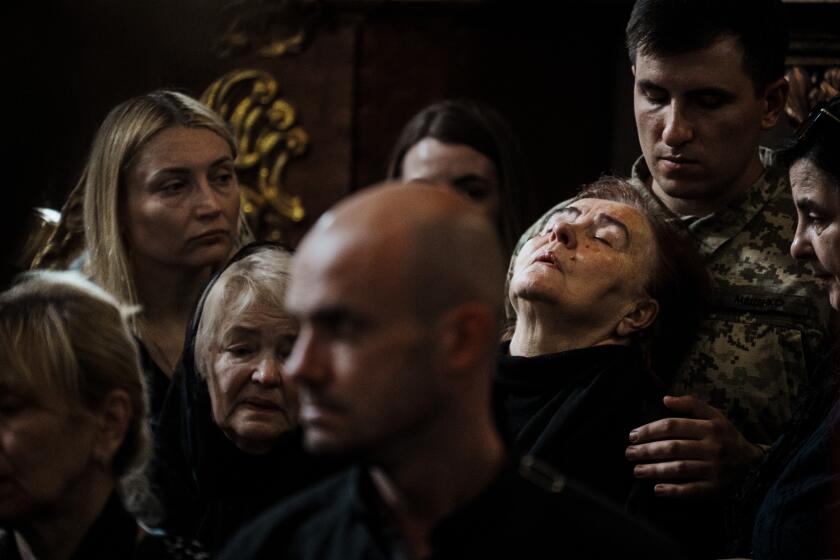
- Share via
KYIV, Ukraine — Could Ukraine lose this war?
For more than two years, as this country of 44 million people has fought off an all-out invasion by neighboring Russia, a spirit of stubborn optimism prevailed even amid the most frightening moments. Any notion of defeat was unthinkable, an almost taboo topic.
But now the question hovers, flitting in and out of view: What if?
The stalling of crucial American aid, a distinct dimming of the world spotlight, and simple war weariness are all exacting a heavy cost. On the front lines, exhausted Ukrainian troops are rationing ammunition as they fend off the latest Russian advances, and anxiety is mounting along with the military and civilian toll.
“Every day, we’re dying,” said Marta Tomakhiv, 33, standing in a sharp-edged shadow in Kyiv’s main Independence Square last week, mourning a friend from her western Ukrainian hometown who was killed in battle days earlier in the east.

By and large, Ukrainians still believe they can hold out against a resurgent and powerful foe — if for no other reason, as nearly everyone here points out, than that they are in a fight for their lives.
“There’s absolutely no choice — we know very well what they would do to us if they could,” Artem Morhun, a 30-year-old lawyer on his way to work in downtown Kyiv, said of the invading Russian forces.
Few Ukrainians have forgotten the brutal atrocities perpetrated by occupying Russian troops in Kyiv’s once-placid suburbs early in the war, or the wholesale destruction and massacres in still-captive cities such as Mariupol, in the country’s southeast.
Russian atrocities number in the tens of thousands, Ukraine says. The ICC wants to arrest Putin. But what are the prospects for justice?
After months of military setbacks, however, many here wonder whether the long front lines that arc across Ukraine’s south and east can hold, or even whether Russian troops could seize a major city.
Without a rapid infusion of aid, “it will be much harder for us to fight,” said Andriy Borovyk, 38, who was having a coffee outdoors with a friend in the city center. “I think we could lose some territories, definitely.”
Like many others here, he likened the attitude of some of Ukraine’s allies to that of European leaders before World War II, as Adolf Hitler was coming to power.
“I think that Westerners are in a warm bath, as we say in Ukraine — like in 1939, they think it will never affect them,” said Borovyk, who works for an anti-corruption nongovernmental organization. “But it will. History has a cycle.”
In a Ukrainian village, a woman wants only one thing: to find her husband, who disappeared shortly after Russia’s war on Ukraine started two years ago.
A metropolis the size of Chicago, Kyiv looks much like any sophisticated European capital: stately architecture, craft breweries, ubiquitous electric scooters, colorful springtime blooms in spacious, well-tended parks. But beneath the bustle runs an undercurrent of dread.
Although Kyiv lies hundreds of miles from the battle zone, war’s hallmarks are in plain view: a sea of fluttering blue-and-yellow flags commemorating fallen soldiers, QR codes plastered on posters for crowdfunding efforts to buy drones or other supplies for field units, men and women in camouflage uniforms kissing loved ones goodbye at train stations.
How do citizens of Kyiv cope with the sleep deprivation and stress from Russia’s war on Ukraine? Some push it down, some try yoga or dancing.
Even an open-air display of wrecked, rusting Russian military vehicles — installed early in the war as a morale booster in a square outside a landmark Kyiv monastery — is more likely these days to inspire a frisson of foreboding than a spurt of national pride.
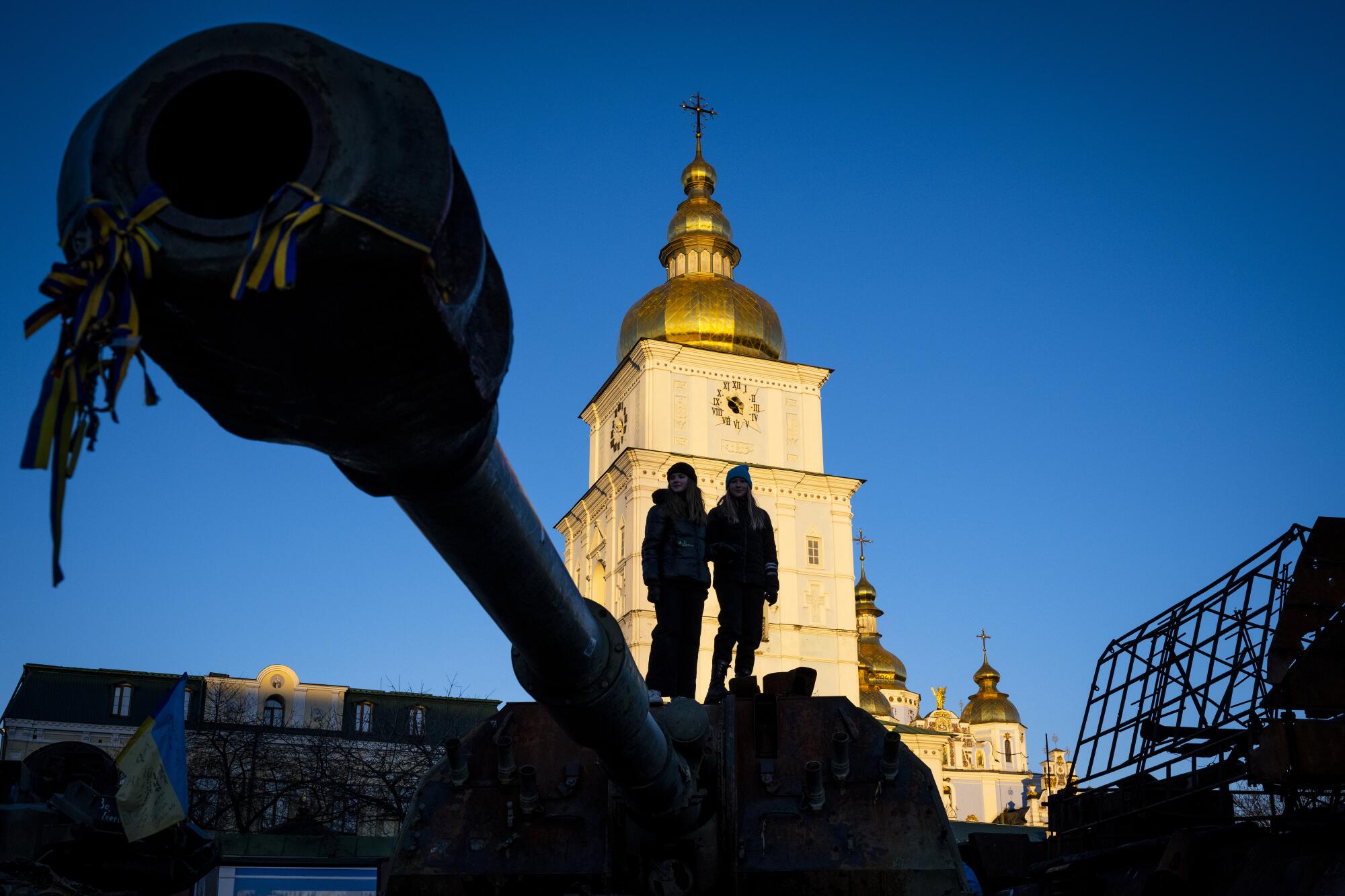
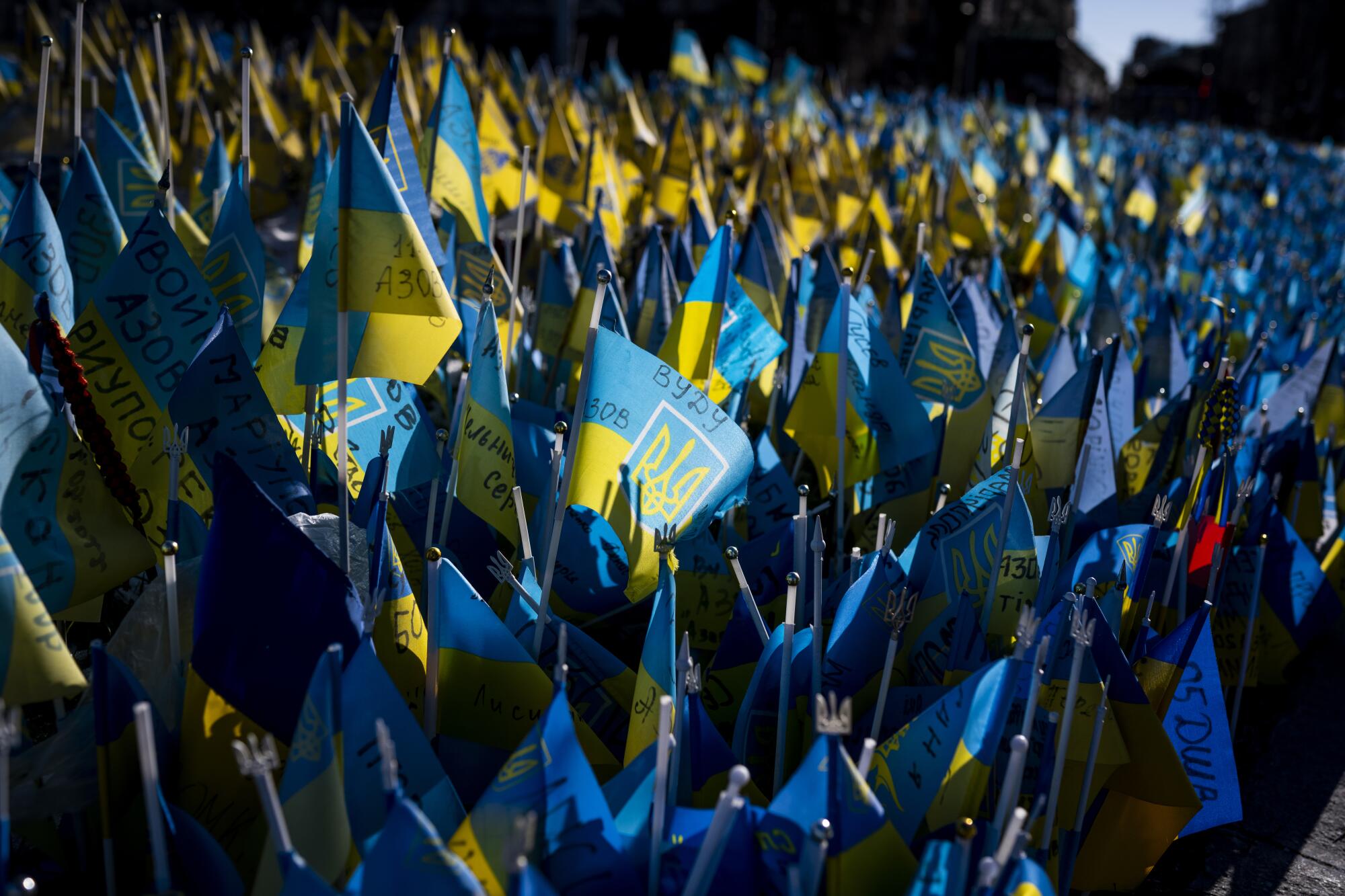
In the war’s heady early months, after Russian forces menaced Kyiv but then were forced to pull back, people flocked to the square to take selfies, and children played tag among the hulking wrecks. The display has been a frequent backdrop for visiting foreign dignitaries, including President Biden, who strolled the square last year.
For Marina Kozulina, a 50-something Kyiv woman walking her little black dog near a half-ruined tank, the military detritus in the square has become more a reminder of peril than triumph.
Even as air-raid sirens wailed, Biden met with Ukraine’s leader to pledge continued U.S. support, both moral and material, for Kyiv against Russia.
“Seeing this makes me nervous, to think about how close the Russians were to Kyiv, and if they could be again,” she said. “I want us to win, but it’s very difficult.”
Even President Volodymyr Zelensky, the former comedian who has tirelessly rallied compatriots since the invasion of Feb. 24, 2022, is taking an increasingly grim tone as cities across the country are pummeled nightly by relentless Russian drone and missile attacks.
Zelensky, in an interview this week with “PBS NewsHour,” alluded despairingly to the recent destruction of a crucial power plant outside Kyiv, saying Russia’s strike succeeded because “we have run out of all the missiles” that had protected it.
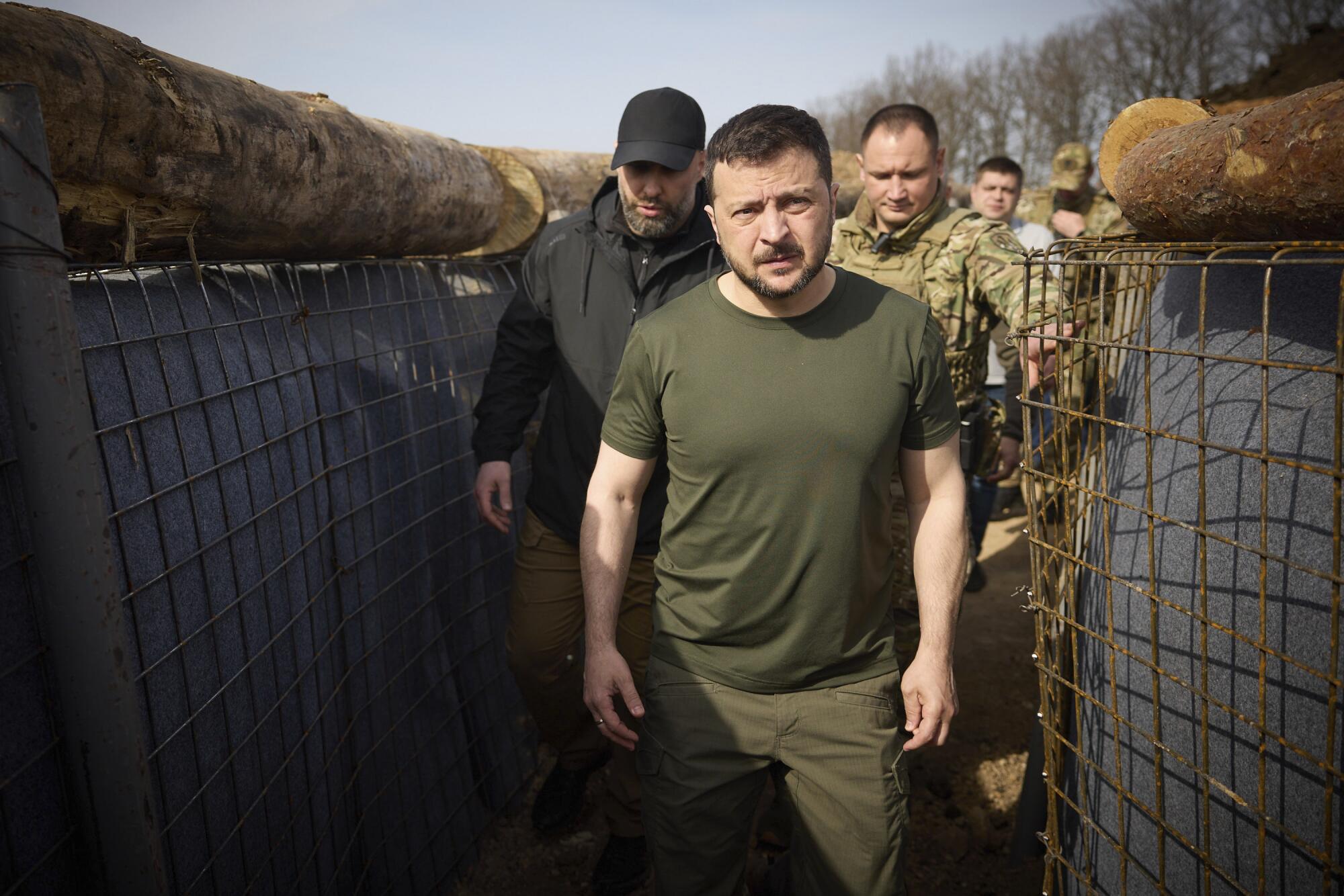
More gloomy news from the battle zone came this month, as the head of Ukraine’s military warned that conditions in the country’s east had “significantly worsened.”
Writing on the messaging app Telegram, the military chief, Gen. Oleksandr Syrskyi, said warmer spring temperatures were drying up previously muddy terrain, allowing Russian forces to step up their assaults with tanks and other armored vehicles.
With vast swaths of Ukrainian territory ever more vulnerable, its government has been careful to not grumble publicly over the display of aerial prowess shown by Israel and its allies, including the U.S., in thwarting a massive weekend Iranian missile and drone attack on Israel.
But on Monday, Foreign Minister Dmytro Kuleba allowed himself a bit of wistful musing about what support from partners could achieve.
“Give us what we need, and we will do the rest of the job,” he said.
Until recently, explicit talk of potential military defeat was considered largely out of bounds for Ukrainian officials, because they did not want to appear to be seeking expensive Western backing to wage what could ultimately prove a fruitless struggle.
But Zelensky did not mince words in a video meeting this month with a Ukrainian aid group: “It is necessary to specifically tell Congress that if Congress does not help Ukraine, Ukraine will lose the war,” he said.
Many Ukrainians have an extremely detailed grasp of U.S. election-year politics, and any visiting American is asked again and again: When is more help coming?
“We’re grateful — more than grateful,” said Anastasia Shevchuk, 16, who was out shopping downtown with friends. “But everyone understands that if Russia wins here, it’s a big, big threat to all of Europe, and the rest of the world as well.”
Even some of Kyiv’s close allies have grumbled that it doesn’t seem sufficiently grateful for the aid it’s received. How thankful is thankful enough?
Attention here is heavily focused on the $60-billion U.S. aid package that has been blocked for months by congressional Republicans. It may yet be put to a vote this month, but is still in danger of being derailed by internecine fighting in the GOP.
“Voting on this aid, it’s a matter of life and death — we depend on our partners, especially the U.S.,” said Bohdan Krylyvenko, 38, sitting in the sunshine outside a fast-food restaurant. “You might think, ‘Oh, McDonald’s is open, everything looks OK.’ But it’s totally not OK.”
Across the country, near-nightly Russian attacks exact a growing toll. The United Nations’ human rights monitoring mission in Ukraine said at least 604 Ukrainian civilians were killed or injured in such strikes — hitting apartment blocks and shops, churches and cultural sites — in March.
“The situation in Ukraine is dire; there is not a moment to lose,” the U.S. ambassador to Ukraine, Bridget Brink, wrote Thursday on the social media platform X as missile barrages struck several parts of the country.
In a conflict marked by dramatic ups and downs over the last two years — initial fears that Ukraine would be swiftly subdued, an inspirational underdog narrative as the country successfully defended itself, stunning Ukrainian counteroffensives in the country’s south and east in 2022 — recent months, by contrast, have brought a drumbeat of bad news.
Last year’s much-vaunted summer counteroffensive foundered amid muted but pointed mutual recrimination between Ukrainian officials and American backers over battle tactics. The eastern town of Avdiivka fell to Russian forces in February, the first such Ukrainian loss in nine months, a defeat perhaps even more stinging symbolically than tactically.
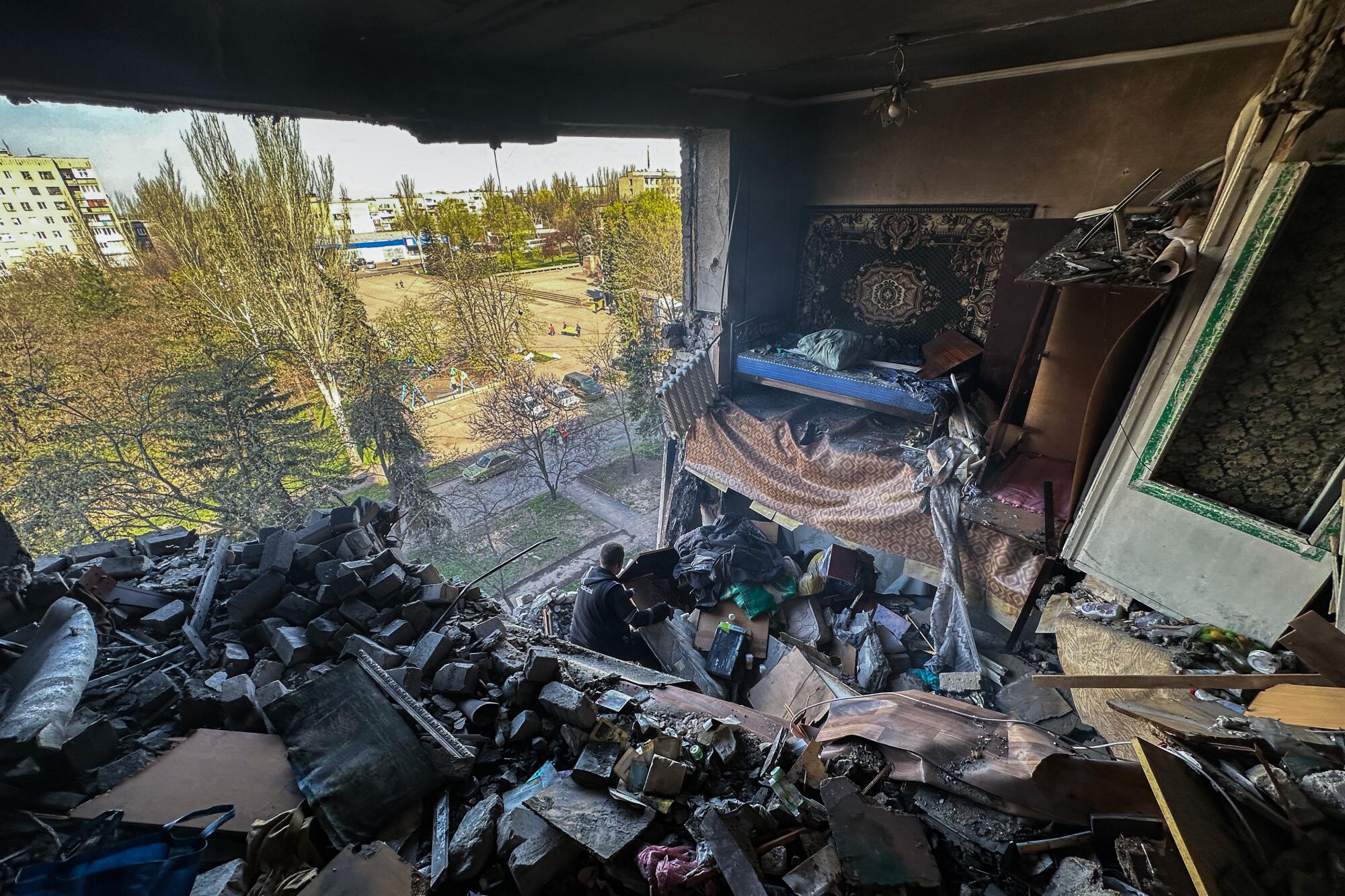
Manpower shortages in the ranks of a professional army bolstered at the war’s outbreak by citizen soldiers — teachers, accountants and mechanics who rushed to volunteer — have forced an unpopular measure to lower the military mobilization age from 27 to 25. And in the battle zone, artillery stocks have dwindled alarmingly, the senior U.S. commander in Europe warned Congress last week.
This Ukrainian artist was known for whimsical sculptures. Now, amid Russia’s war on Ukraine, he creates art from war debris, military weapons and fury.
Testifying before the House Armed Services Committee, Army Gen. Christopher Cavoli said that within weeks, Ukrainian forces will be vastly outgunned if more armaments are not rushed in.
“They are now being outshot by the Russian side 5 to 1,” Cavoli said of Ukrainian troops. “The Russians fire five times as many artillery shells at the Ukrainians than the Ukrainians are able to fire back. That will immediately go to 10 to 1 in a matter of weeks.”
The general added: “We’re not talking about months. We’re not talking hypothetically.”
The Ukrainian side can claim successes as well, some of which its leaders believe have gone unfairly unheralded. Those include stepped-up domestic production of much-needed drones, and securing a shipping lane for grain exports as Ukraine — a country without a formal navy — has sunk or disabled one-third of all Russian warships in the Black Sea with missile and drone attacks.
Ukraine has also harried Moscow with strikes aimed mainly at Russian energy installations — mirroring, though at a far smaller scale, the destructive Russian attacks aimed at Ukraine’s power grid. But some Ukrainian officials have grumbled that they are not allowed to use Western-supplied weaponry beyond the country’s borders.
Military analysts say the drop-off in aid not only contributes to battlefield hardship now, but also makes it difficult for Ukraine to make plans to try to recapture military momentum.
“It’s a dual challenge — to stabilize the current front line, and put in place significant defenses so the Russian advances this year are blunted,” said Matthew Savill, the director of military sciences at the Royal United Services Institute, a British defense and security think tank.
Because of the immediate and short-term difficulties, a major Ukrainian counteroffensive this year is a near-impossibility, he said.
In the meantime, European allies are seeking to break the U.S. congressional logjam. British Foreign Secretary David Cameron met this month with Secretary of State Antony J. Blinken, describing the blocked assistance as not only pivotal for Ukraine, but also “profoundly in your interest” — that of the United States.
In a telling bit of realpolitik, however, the British foreign secretary also made the trek to Florida for a meeting with former President Trump, who, as he seeks a second term, has played a key role in dissuading his congressional allies from endorsing the aid. After the meeting, Cameron made no claim of progress.
Even far from Ukraine’s front lines, military funerals set off waves of mourning. ‘You can’t see an end to it,’ one chaplain says as the war drags on.
In every corner of Ukraine, the fallen return home daily.
In Kyiv, two wooden caskets bearing soldiers’ bodies were brought to Independence Square — the heart of Ukraine’s 2014 pro-democracy protests — in a solemn parade, with mourners kneeling at their passing.
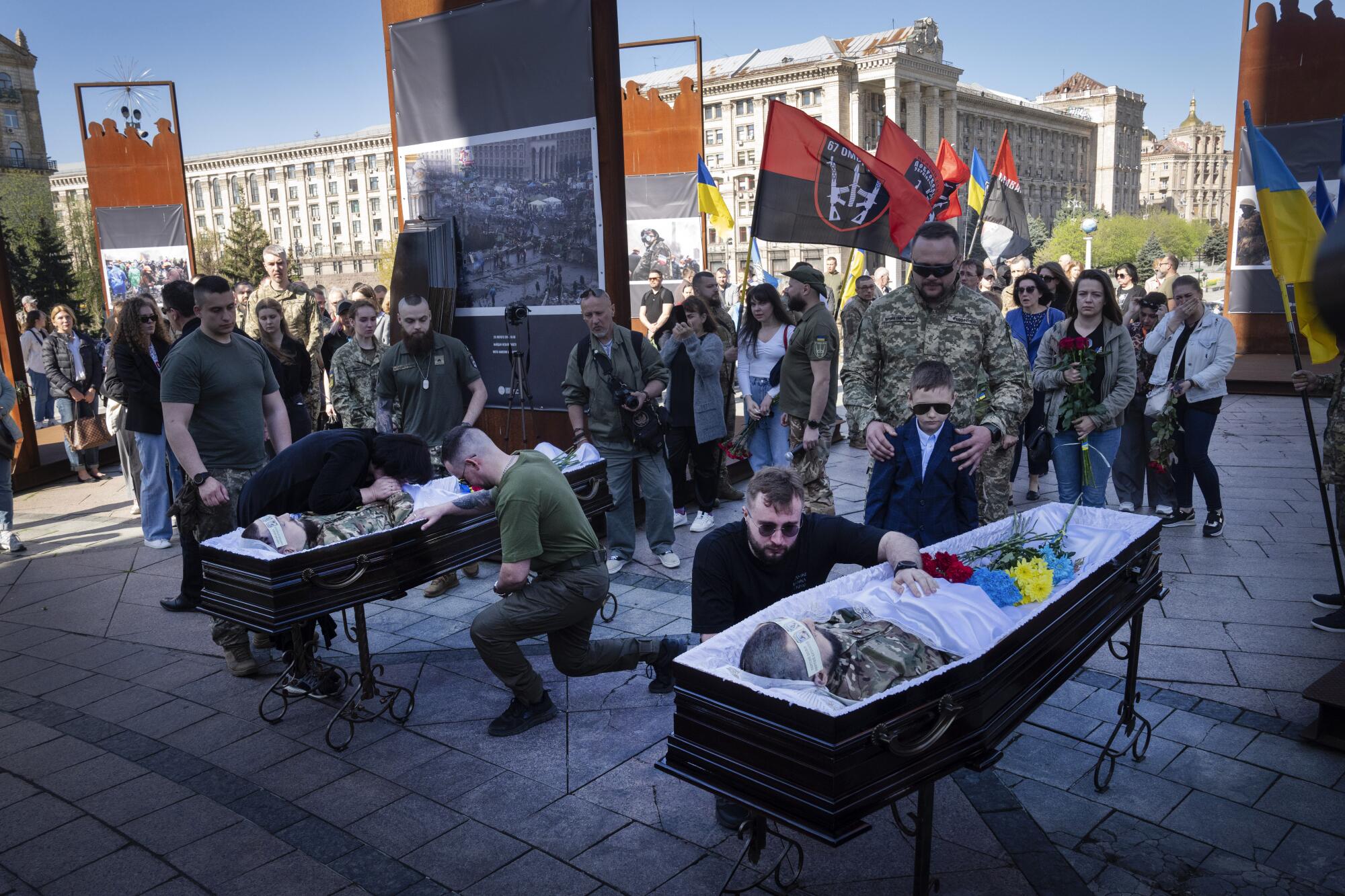
Looking on was a 36-year-old lieutenant colonel named Bohdan, a friend of one of the dead soldiers. He described his feelings when his own 2-year-old son, no stranger to air alerts, asked him when the missiles would come again.
“When he grows up, I don’t want him to have to fight this kind of war, but without the world’s help, maybe he will have to,” said the officer, who, in keeping with military policy, did not want his full name used.
He watched bleakly as the coffins were carried to the foot of a towering monument to Ukraine’s 1991 independence.
“Many people, the best people of our nation, will die,” he continued. “But we will fight. We have no choice.”
More to Read
Sign up for Essential California
The most important California stories and recommendations in your inbox every morning.
You may occasionally receive promotional content from the Los Angeles Times.
